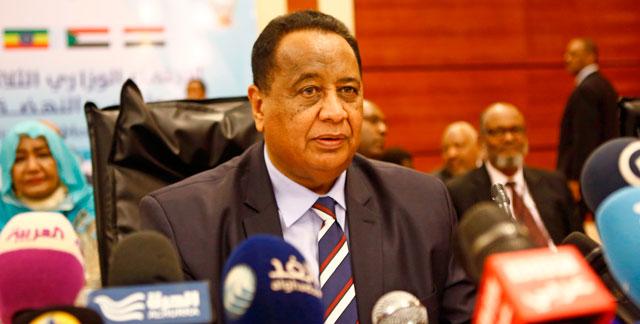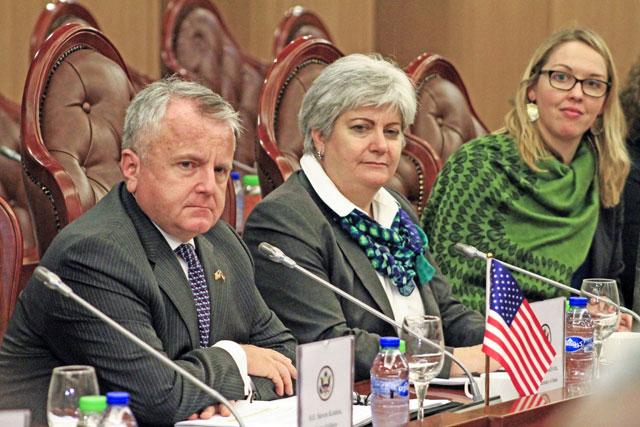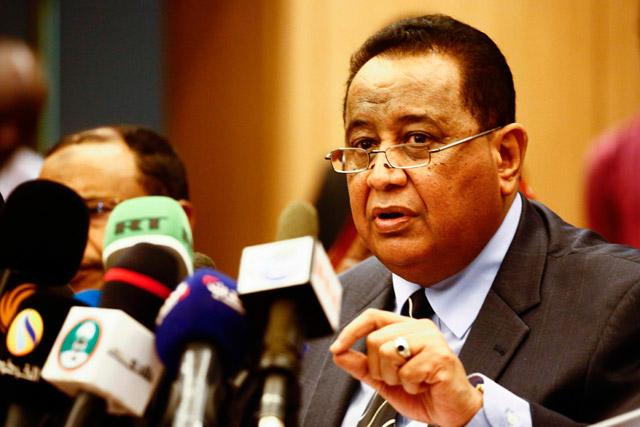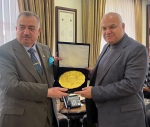You are here
Minister’s ouster unlikely to slow Sudan’s push to get off US ‘terror’ list
By AFP - Apr 21,2018 - Last updated at Apr 21,2018

In this file photo taken on April 5 in the Sudanese capital Khartoum, Sudanese Foreign Minister Ibrahim Ghandour attends the tripartite talks over an Ethiopian controversial dam being built on the Blue Nile (AFP photo)
KHARTOUM, Sudan — President Omar Al Bashir's dismissal of Sudan's foreign minister, Khartoum's top negotiator with Washington, is unlikely to affect efforts to have Khartoum removed from a US "terrorism" blacklist, experts say.
On Thursday, Bashir sacked Ibrahim Ghandour, who headed negotiations with Washington that in October helped lift a decades-old US trade embargo on Khartoum.
His dismissal comes amid an economic crisis in the African country and his replacement, who has yet to be named, is set to inherit a complicated case load.
Ghandour, the first official to publicly raise concerns over Sudan's economic crisis, was fired a day after he said in parliament that Sudanese diplomats abroad had not been paid in months.
But analysts say his sacking is not expected to derail ties between Khartoum and Washington, which have warmed since the sanctions were lifted.
"Ghandour's loss will be felt, but his going won't change Khartoum's policy direction," Magnus Taylor, Sudan analyst at the International Crisis Group, told AFP.
By dismissing Ghandour, Khartoum is not changing its "moderate" policy towards Washington, he said.
"Generally, Sudanese are focused on getting themselves out of the SSTL," Taylor said, referring to Washington's State Sponsors of Terrorism List.
Although Washington lifted sanctions imposed in 1997 over Khartoum's alleged support of Islamist militant groups, it has kept Sudan on the blacklist along with Iran, Syria and North Korea.
Al Qaeda founder Usama Bin Laden lived in Sudan between 1992 and 1996.
Officials say the US terror tag prevents international banks from doing business with Khartoum, in turn hampering Sudan's economic revival.
Ghandour had been pushing for Khartoum's removal from the blacklist in a bid to obtain much needed foreign loans.
"He was useful for negotiations with the US because people thought they can deal with him as he was reasonable, eloquent and intelligent," Taylor said.
"But Sudan will bring someone else who can do that kind of job."
Sudan is saddled with a foreign debt of more than $50 billion, which makes securing new loans even more difficult, experts say.
After a November meeting with Ghandour in Khartoum, US Deputy Secretary of State John Sullivan had said that Washington was ready to begin discussing Sudan's removal from the blacklist.
"We are prepared... to engage with them on all that would be required to have them removed from the list of state sponsors of terrorism," Sullivan said.
But lobby groups like the Washington-based Enough Project have warned against it.
"Even while sharing some intelligence with the CIA, the Sudan regime has maintained extensive ties with active extremist organisations and clerics within Sudan," wrote Enough Project founder John Prendergast in an article in February.
Khartoum's growing cooperation in areas of intelligence-sharing with Washington helped lift the sanctions, US officials say.
Meanwhile, experts said that Ghandour's successor will need a long time to build confidence with his regional and international counterparts, especially while negotiating controversial issues like the Grand Renaissance Nile Dam that Ethiopia is building.
"His successor will need a long time to understand such a complicated file and to build confidence with Egyptians and Ethiopians," said prominent Sudanese columnist Faisal Saleh.
Ghandour, largely respected by his regional counterparts, hosted talks this month with Egypt and Ethiopia over the project, but the discussions failed to break an ongoing deadlock.
Ethiopia's $4-billion dam has triggered tensions with Egypt, as Cairo fears the dam will reduce water supplies from the River Nile to Egypt once operational.
Egypt relies almost completely on the Nile for irrigation and drinking water, and says it has "historic rights" to the river.
Ghandour's comments on the absence of diplomatic salaries were illustrative of Sudan's larger economic crisis, experts said.
Sudan's overall economy was hit hard after the south separated from the north in 2011, taking with it about 75 per cent of greater Sudan's oil earnings.
A surging inflation rate of about 56 per cent, regular fuel shortages and rising prices of food items have triggered sporadic anti-government protests in Khartoum.
"What they need is a bail out," said Taylor.
"They are saddled with an enormous amount of debt. What he said is evidence of something much more serious."
Related Articles
KHARTOUM — Two French engineering companies were chosen Tuesday to carry out environmental impact studies on Ethiopia's planned Grand Renais
KHARTOUM — US Deputy Secretary of State John Sullivan arrived on Thursday in Sudan for a two-day visit to push for human rights and religiou
KHARTOUM — Sudan said Thursday it will press on with efforts to achieve a full lifting of US sanctions against Khartoum, even as it hoped Wa
















